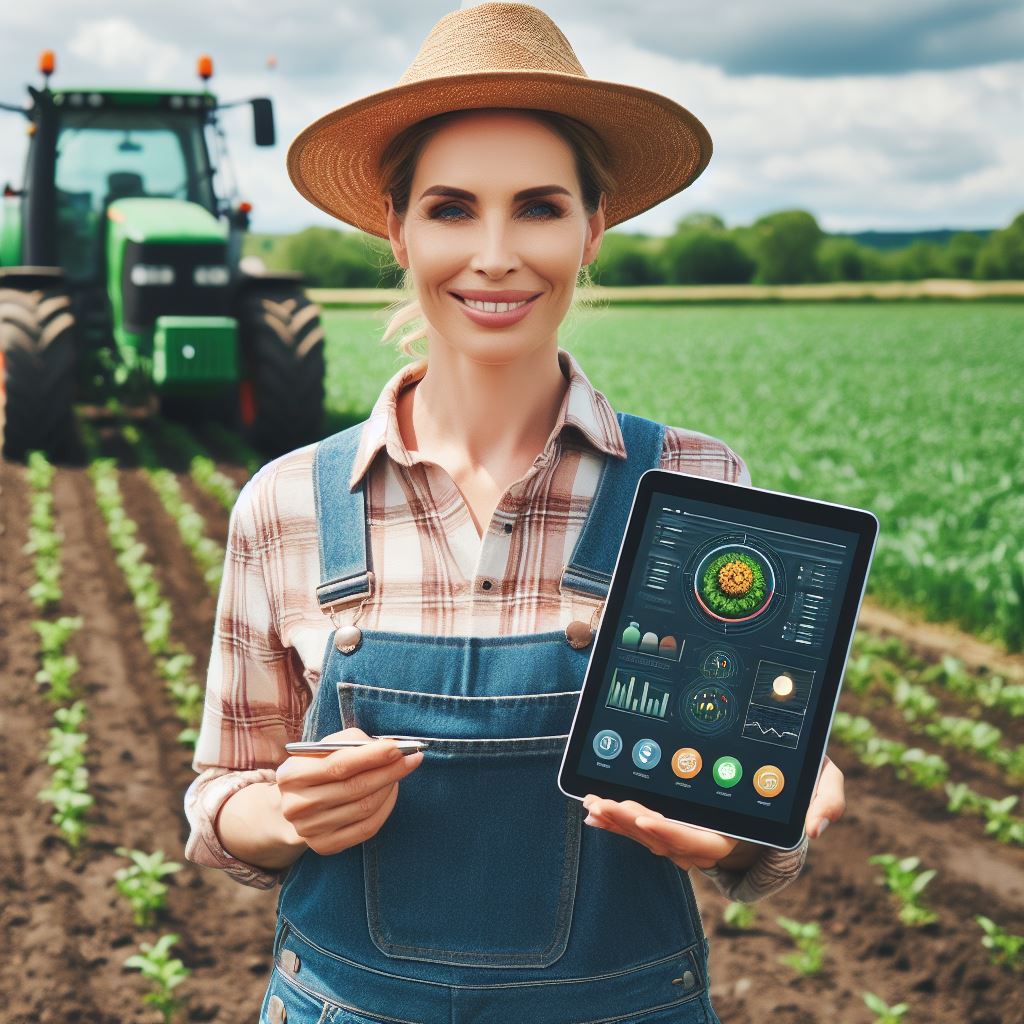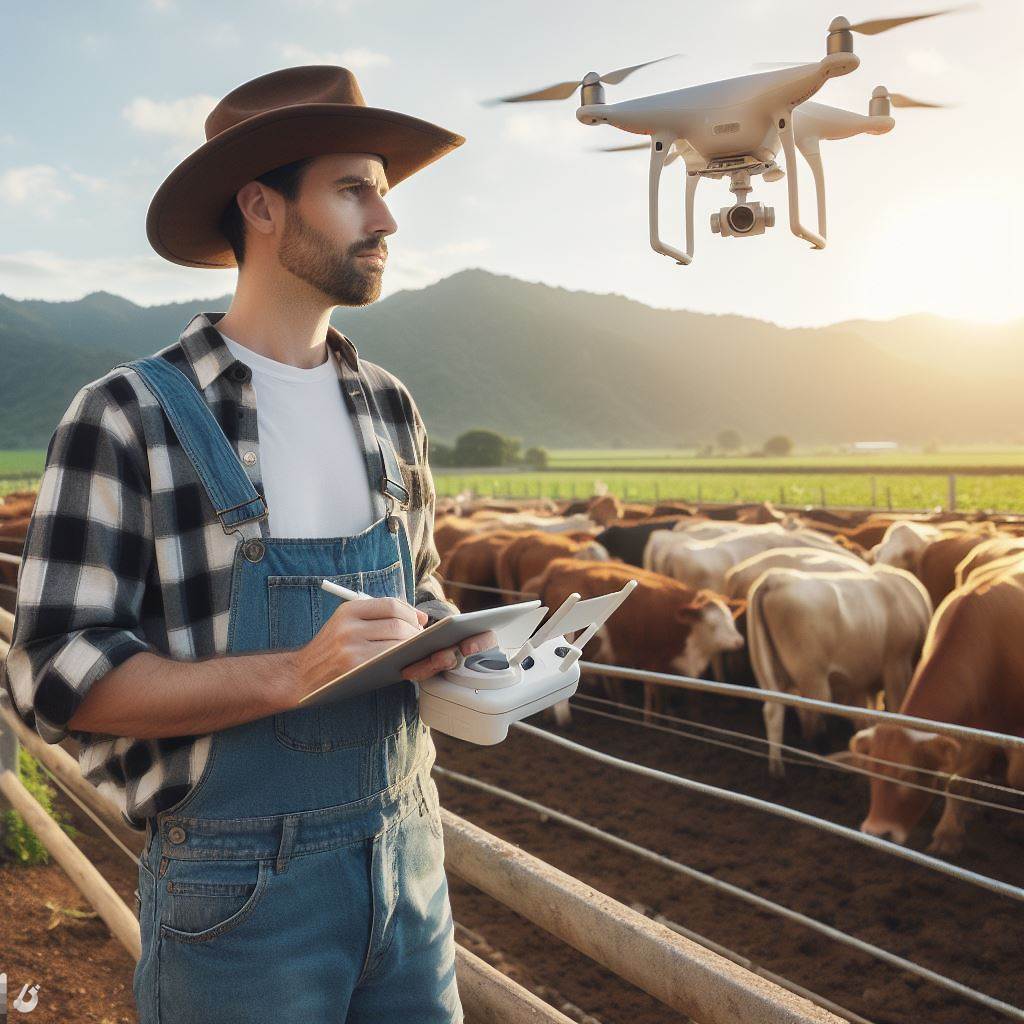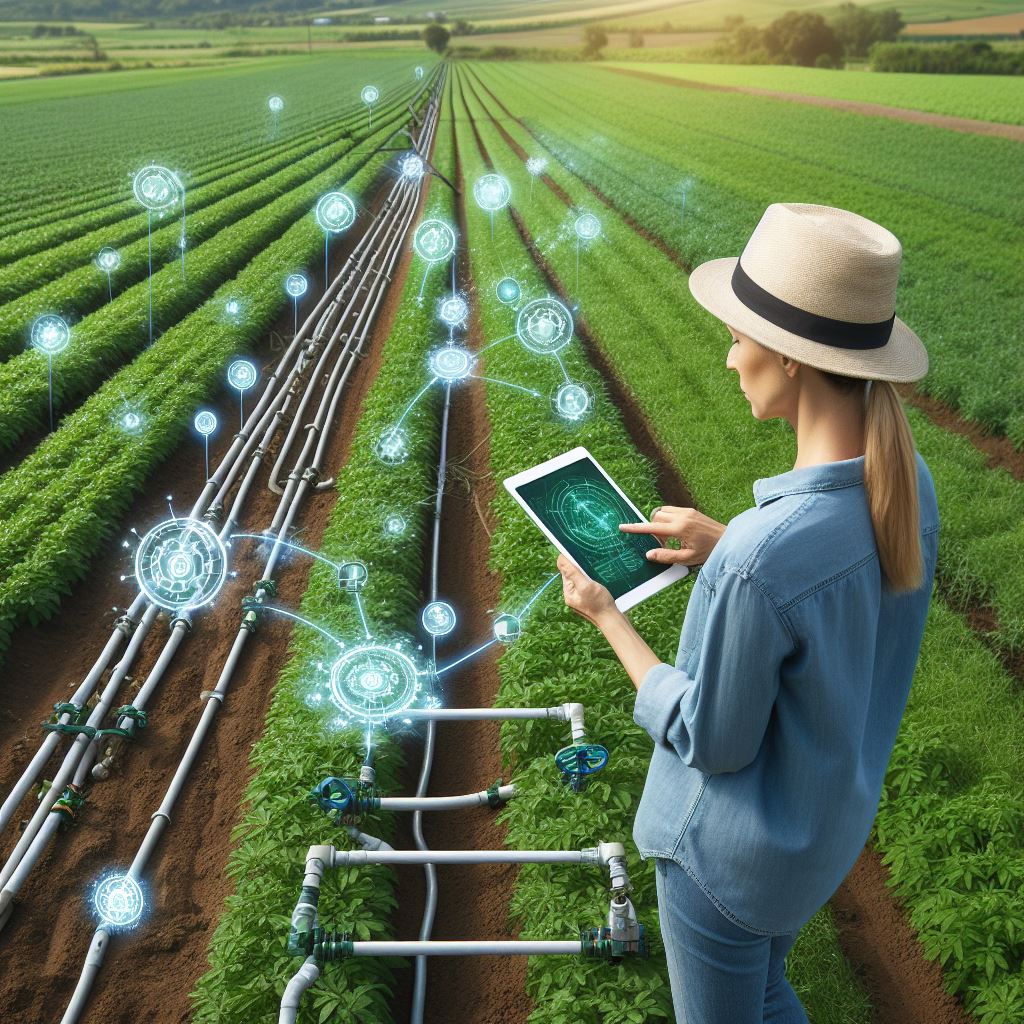Introduction
Climate-smart agri-tech solutions refer to innovative technologies that help farmers mitigate climate change impacts on their farms.
These solutions include precision farming, remote sensing, and weather forecasting tools.
They aim to reduce greenhouse gas emissions, improve resource efficiency, and enhance climate resilience in agriculture.
Climate-smart solutions are crucial for farms due to the increasing climate change challenges.
They help farmers adapt to changing weather patterns, manage water resources efficiently, and optimize crop production.
These solutions also promote sustainable farming practices, which contribute to food security and environmental conservation.
Implementing climate-smart agri-tech solutions can increase farm productivity, reduce production costs, and enhance the overall agricultural sector’s resilience.
In a nutshell, climate-smart agri-tech solutions play a vital role in ensuring sustainable and resilient farming practices.
They enable farmers to adapt to climate change, reduce environmental impacts, and secure food production for future generations.
Read: Innovations in Livestock Comfort Control
Benefits of Climate-Smart Agri-Tech Solutions for Farms
Climate-smart agri-tech solutions offer numerous benefits for farms, empowering farmers to adapt to climate change challenges effectively.
These innovative technologies not only improve the resilience of farms but also contribute to increased crop yields while sustaining the environment.
Improving Resilience to Climate Change
- Drought and flood management: Climate-smart agri-tech solutions help farmers anticipate and manage extreme weather events.
- Soil erosion prevention: Advanced technologies assist in reducing soil erosion risks and improving soil health.
- Water and energy conservation: Agri-tech solutions optimize water and energy usage, promoting efficient and sustainable practices.
Increasing Crop Yields
- Precision agriculture techniques: Smart sensors and data analytics enable farmers to make informed decisions, resulting in higher crop yields.
- Controlling pests and diseases: Agri-tech solutions provide real-time monitoring and early detection of pests and diseases, minimizing crop damage.
- Optimal fertilizer and nutrient management: Precise application of fertilizers and nutrients ensures plants receive the required amount, maximizing yield potential.
Enhancing Sustainability and Environmental Stewardship
- Reducing greenhouse gas emissions: Climate-smart agri-tech solutions promote sustainable farming practices that minimize greenhouse gas emissions.
- Minimizing chemical usage: Advanced technologies enable targeted and reduced application of chemicals, reducing environmental impact.
- Promoting biodiversity and soil health: Agri-tech solutions support practices such as crop rotation and cover cropping to enhance biodiversity and maintain soil fertility.
In summary, climate-smart agri-tech solutions bring significant benefits to farms.
Innovative technologies empower farmers to address climate change challenges, increase crop yields, enhance sustainability, and ensure long-term viability.
By adopting these solutions, farmers can optimize their resources, mitigate risks, and contribute to a more sustainable and resilient agricultural sector.
Transform Your Agribusiness
Unlock your farm's potential with expert advice tailored to your needs. Get actionable steps that drive real results.
Get StartedRead: Agri-Tech in Livestock Management: New Trends
Examples of Climate-Smart Agri-Tech Solutions for Farms
The advancement of agri-tech solutions has brought about various climate-smart practices for farms.
These solutions leverage cutting-edge technologies to address challenges posed by climate change and improve overall agricultural sustainability.
By adopting these innovations, farmers can enhance productivity, minimize resource wastage, and reduce their ecological footprint.
Weather Monitoring and Forecasting Technologies
- Weather monitoring and forecasting technologies play a crucial role in climate-smart agriculture.
- Remote sensors and weather stations offer real-time data for informed decisions on planting, crop protection, and irrigation schedules.
- Satellite imagery and drones offer a comprehensive view of the farm, enabling farmers to analyze weather patterns and identify potential risks.
Precision Farming Technologies
- Precision farming technologies contribute to optimizing resource utilization on farms.
- GPS guidance systems integrated into machinery allow for precise navigation, resulting in accurate application of inputs such as fertilizers and pesticides.
- This technology minimizes overspray and runoff, reducing environmental impact and optimizing input costs.
- Variable-rate technology further enhances precision by adjusting seed and chemical applications based on the variability of soil conditions, leading to improved yield and resource efficiency.
- Additionally, robotic systems automate labor-intensive tasks like harvesting and weeding, increasing productivity while reducing the need for manual labor.
Smart Irrigation and Water Management
- Smart irrigation and water management techniques are vital for sustainable farming.
- Water sensors and moisture management systems enable farmers to monitor soil moisture levels, leading to efficient irrigation practices.
- Drip irrigation and micro-sprinklers deliver water directly to plant roots, minimizing evaporation and ensuring optimal water usage.
- Water-efficient irrigation scheduling tools consider multiple factors such as weather forecasts, soil moisture levels, and crop water requirements to maximize water-saving potential.
Data Analytics and Decision Support Systems
- Data analytics and decision support systems provide farmers with valuable insights for optimized farm management.
- Farm management software and applications enable efficient data collection, organization, and analysis, assisting farmers in making informed decisions.
- Predictive modeling utilizes historical data to predict future outcomes, helping farmers optimize planting schedules, identify pest and disease risks, and optimize resource allocation.
Alternative Energy and Waste Management Solutions
- Incorporating alternative energy and waste management solutions promotes sustainability and reduces greenhouse gas emissions.
- Solar panels and wind turbines harness renewable energy sources, providing farms with clean and affordable power.
- Biomass and bioenergy technologies utilize agricultural waste, such as crop residues and animal manure, to produce energy while reducing waste volumes.
- Composting and anaerobic digestion systems break down organic waste, converting it into nutrient-rich materials for soil improvement.
In closing, climate-smart agri-tech solutions offer a range of tools for farmers to mitigate the impacts of climate change and promote sustainable agricultural practices.
Weather monitoring, precision farming, smart irrigation, data analytics, and alternative energy empower farmers to make informed decisions, minimizing environmental impact and ensuring agricultural resilience.
By embracing these technologies, farmers can create a more sustainable future for food production while adapting to the challenges posed by climate change.
Read: Crop Monitoring Tech: Agri-Tech’s New Tools

Challenges and Considerations for Implementing Climate-Smart Agri-Tech Solutions
Cost and accessibility of technology
Implementing climate-smart agri-tech solutions may be hindered by high upfront costs and limited access to technology.
Farmers must consider the return on investment and affordability of adopting these solutions.
However, innovative financing models and partnerships with technology providers can help overcome this challenge.
Farmer training and capacity building
Farmers need to be adequately trained to understand and effectively use climate-smart agri-tech solutions.
Capacity building programs are essential to provide farmers with the necessary skills and knowledge.
These programs should be tailored to the specific needs and challenges of smallholder farmers.
Interoperability of different technologies and systems
The integration and compatibility of various agri-tech solutions pose a significant challenge.
Different technologies and systems may not communicate or share data seamlessly.
Efforts must be made to develop interoperable solutions that allow farmers to access and utilize multiple technologies.
Data security and privacy concerns
Agri-tech solutions generate vast amounts of data, raising concerns about security and privacy.
Farmers must trust that their data is protected from unauthorized access or misuse.
Strong data encryption and compliance with privacy regulations are crucial for addressing these concerns.
Policy and regulatory framework support
- Lack of supportive policies and regulations can impede the widespread adoption of climate-smart agri-tech solutions.
- Governments need to develop frameworks that incentivize the use of these technologies.
- Policies should address issues such as data ownership, intellectual property rights, and technology standards.
Ultimately, implementing climate-smart agri-tech solutions on farms requires addressing several challenges and considerations.
The cost and accessibility of technology, farmer training, interoperability of technologies, data security, and policy support are critical factors to consider.
By overcoming these challenges, farmers can embrace climate-smart agri-tech solutions and enhance their productivity and resilience.
Read: Water-Saving Tech in Agriculture: Startups to Watch
Showcase Your Farming Business
Publish your professional farming services profile on our blog for a one-time fee of $200 and reach a dedicated audience of farmers and agribusiness owners.
Publish Your ProfileConclusion
Climate-smart agri-tech solutions are indispensable, offering farms resilience against climatic challenges and sustainable practices.
Farmers, explore and adopt these innovative tools tailored to your unique needs.
The benefits extend beyond immediate gains, fostering long-term environmental sustainability and economic viability.
Embrace the evolving landscape of climate-smart agri-tech, where future prospects promise even more efficient and sophisticated solutions.
The ongoing commitment to research and development ensures a continual evolution, empowering farmers with cutting-edge tools to navigate the complexities of modern agriculture in an ever-changing climate.
Anticipate technology advancements offering enhanced precision, resource optimization, and customized solutions, empowering farmers in an era where sustainability is imperative.
The journey towards a climate-resilient and sustainable agriculture sector is an ongoing one, and farmers stand at the forefront of this transformative movement.




